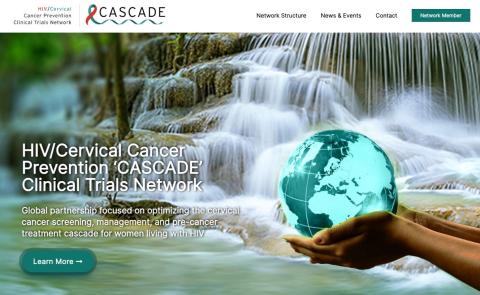NCI’s HIV/Cervical Cancer Prevention ‘CASCADE’ Clinical Trials Network is a cooperative agreement-funded program focused on pragmatic clinical trials to optimize the cervical cancer screening, management, and precancer treatment cascade for women living with HIV.
On This Page
- All Heading 2s will automatically be pulled in to this list.
- Do not edit the content on this template.
About CASCADE
CASCADE is a global partnership focused on optimizing the cervical cancer screening, management, and pre-cancer treatment cascade for women living with HIV.
Funding Opportunities
Related Funding Opportunities and Training Resources for CASCADE Grantees.
The ‘CASCADE’ Network Consists of 3 Organizational Units
1 Network Coordinating Center
| Organizational Unit | Principal Investigator(s) | Institution(s) | Grant No. |
|---|---|---|---|
| CASCADE Network Coordinating Center (CNCC) | Suzanne Siminski, M.S., M.B.A., and KyungMann Kim, Ph.D. | Frontier Science, with University of Wisconsin | U24CA275417 |
supported via RFA-CA-21-045
3 Research Bases
|
Organizational Unit |
Principal Investigator(s) |
Institution(s) |
Grant No. |
|---|---|---|---|
|
Research Base 1 (RB1) |
Rachel Winer, Ph.D., M.P.H. and |
University of Washington, with |
|
|
Research Base 2 (RB2) |
Timothy Wilkin, M.D., M.P.H., Anna Giuliano, Ph.D., and |
University of California San Diego with Moffitt Cancer Center and University of North Carolina at Chapel Hill |
|
|
Research Base 3 (RB3) |
Jennifer Smith, Ph.D., M.P.H., Michael Hudgens, Ph.D., and Lameck Chinula, M.D., M.P.H. |
University of North Carolina at Chapel Hill |
supported via RFA-CA-21-046
9 Clinical Sites
|
Organizational Unit |
Principal Investigator(s) |
Institution(s) |
Grant No. |
|---|---|---|---|
|
Clinical Trials Site 1 (CS1): Uganda |
Betty Mwesigwa, M.B.Ch.B., M.Sc. |
Makerere University Walter Reed Project, with US Military HIV Research Program and Uganda Cancer Institute |
|
|
Clinical Trials Site 2 (CS2): Kenya |
Michael Chung, M.D., Ph.D., M.P.H. and Samah Sakr, M.B.Ch.B. |
Emory University, with Coptic Hope Center for Infectious Diseases and Kenyatta National Hospital |
|
|
Clinical Trials Site 3 (CS3): Botswana |
Scott Dryden-Peterson, M.D., M.S. and Doreen Ramogola-Masire, M.B.B.S., Ph.D., M.P.H. |
Brigham and Women's Hospital, with Botswana Harvard AIDS Institute Partnership |
|
|
Clinical Trials Site 4 (CS4): US/Georgia |
Lisa Flowers, M.D., M.P.H. and Anandi Sheth, M.D., M.Sc.
|
Emory University |
|
|
Clinical Trials Site 5 (CS5): Rwanda |
Gad Murenzi, M.D., M.S., Kathryn Anastos, M.D., and Rubagumya Fidel, M.D., M.P.H.
|
Research for Development, Albert Einstein College of Medicine, with Rwanda Military Hospital |
|
|
Clinical Trials Site 6 (CS6): Kenya |
Nelly Mugo, M.B.Ch.B., M.P.H., and Kenneth Ngure, Ph.D., M.P.H., M.Sc.
|
Kenya Medical Research Institute (KEMRI), with Jomo Kenyatta University of Agriculture and Technology |
|
|
Clinical Trials Site 7 (CS7): Zimbabwe |
Chirenje Zvavahera, M.D., and Bothwell Guzha, M.B.Ch.B, M.Phil
|
University of California, San Francisco, with University of Zimbabwe |
|
|
Clinical Trials Site 8 (CS8): US/Maryland |
Clement Adebamowo, B.M.Ch.B., Sc.D., and Gregory Taylor, M.D.
|
University of Maryland, Baltimore |
|
|
Clinical Trials Site 9 (CS9): South Africa |
Nivashnee Naicker, M.D., M.P.H, M.A.S. |
Centre for the AIDS Programme of Research in South Africa (CAPRISA) |
three sites supported via RFA-CA-21-047; six additional sites supported via RFA-CA-22-051
Unified Network Initiative to Enhance Community Dialogue and Site Education (UNITED)
UNITED provides a dynamic framework for both ULACNet and CASCADE to promote activities that build shared trust between researchers and communities, and to ensure that research outcomes and benefits are disseminated to study participants and the broader community.
UNITED will enhance both the ULACNet and CASCADE networks by:
- Providing a forum for network members to share knowledge and lessons learned on effective strategies for enhancing study recruitment and community engagement;
- Providing training and educational opportunities for CASCADE and ULACNet members; and
- Providing clinical trial resources for network study participants, their families, and the public.
Learn more about UNITED and view recordings of community engagement sessions
Program Contact(s)
Email: cascade@nih.gov
Phone: 240-276-7332
Fax: 240-276-7828
Program Director
Vikrant Sahasrabuddhe, M.B.B.S., Dr.P.H.
Email: vikrant.sahasrabuddhe@nih.gov

